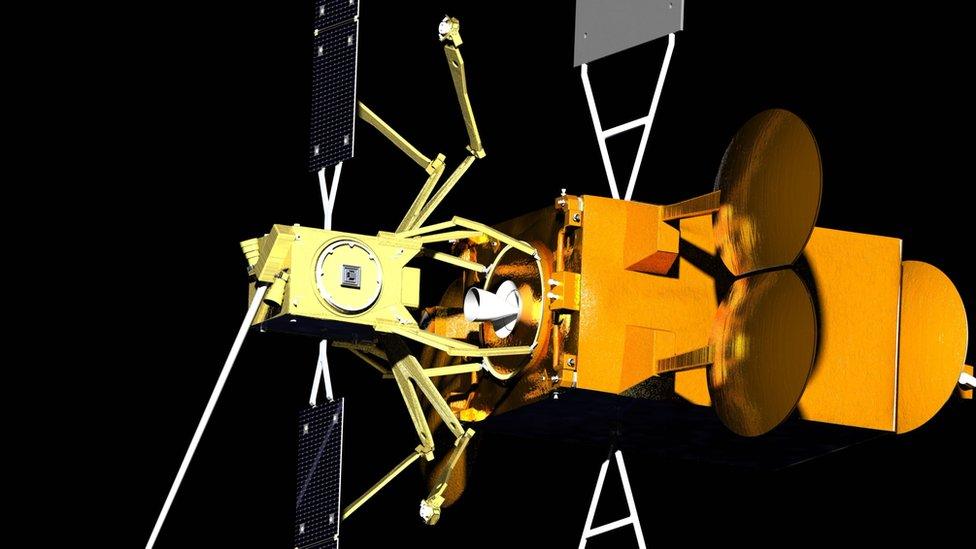UK firm contracts to service satellites
- Published

Artwork: The "Space Drone" (yellow) would dock with the ageing telecommunications satellite (orange)
A UK-headquartered company says it has won a contract to send spacecraft to dock with two existing satellites to extend their lives.
Effective Space will not name the satellites' owner at this stage - only that it is a major regional operator.
The deal is described as being worth more than $100m ($70m).
Effective Space says its two servicing "Space Drones" will be built using manufacturing expertise in the UK and from across the rest of Europe.
The pair, which will each be sized about the same as a washing machine and weigh less than 400kg, are expected to launch on the same rocket sometime in 2020.
Once in orbit, they will separate and attach themselves to the two different geostationary telecommunications satellites that are almost out of fuel.
The drones, using their own propulsion systems, will then take over station-keeping duties 36,000km above the Earth, ensuring the satellites can continue to point in the right direction to transmit their signals.
In-orbit service
Satellite servicing has been talked about as a commercial enterprise for more than decade, but it is only now that the first projects are really coming to market.
The American operator Intelsat, for example, is buying a similar service from manufacturer Orbital ATK.
The latter's initial "Mission Extension Vehicle" should launch later this year.
Daniel Campbell, the managing director of Effective Space, told “óĻó“«Ć½ News: "While in-orbit servicing has been preached for the last 10 years, the main challenge has been to come up with a solution where the cost [of the space drone] is significantly less than a replacement satellite."
Today's big telecommunications satellites can cost upwards of $300m over their 15-year design lives.
For a much more modest outlay, an operator can extend this timeframe with one of Effective Space's drones, so maintaining revenues.
The London-based company's initial focus is on station-keeping, but future markets for similar types of servicing vehicle will almost certainly open up for satellite removal.
Orbits above the Earth are becoming congested, and experts say old and broken hardware needs to be brought out of the sky if the environment is to remain stable.
Effective Space is part of the wave of so-called "new space" companies that have sprung up in recent years.
Fertile ground
Their goal is to drive novel business opportunities and applications off the back of lower-cost systems enabled in large part by the greater use of off-the-shelf consumer electronics and step-change manufacturing techniques such as 3D printing.
It is an approach that has found fertile ground in Britain, with supporting government policies promoted through the UK Space Agency. This has drawn a number of foreign initiatives to base themselves in Britain.
Effective Space, for example, has its roots in Israel and maintains R&D facilities there, but the UK is the place it wants to make its operations centre.
"We are deploying a very innovative service and the only way you can do that is by being able to rely on very solid space law and a supportive space agency," said Mr Campbell.
"And since the Brexit vote, actually, we are seeing more support, more proactive moves, to ensure we're on the right track. There is a tailwind in the UK that allows space companies to thrive."
A UK Space Agency spokesperson commented: āThe governmentās Industrial Strategy set out how the UK can thrive in the commercial space age as technology evolves and innovative companies develop new products and services.
"We engage regularly with these companies and offer a safe and competitive regulatory environment for new commercial ventures to support our growing space sector.ā